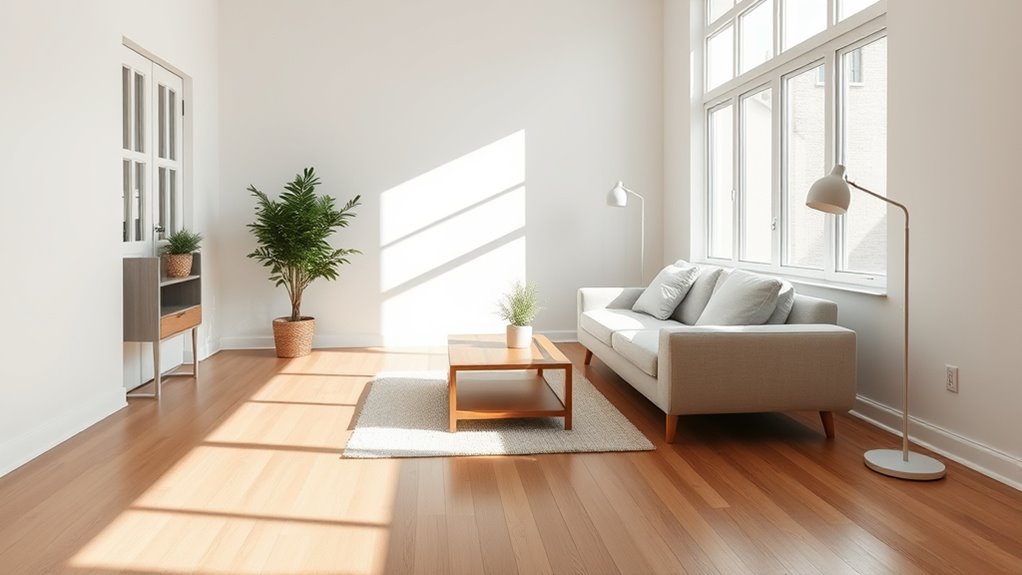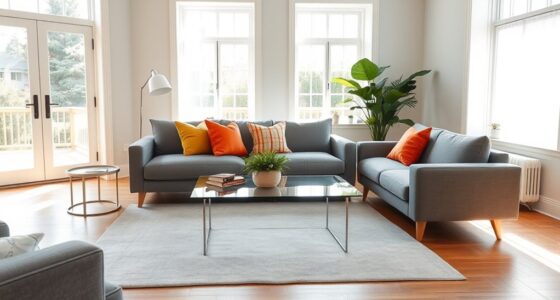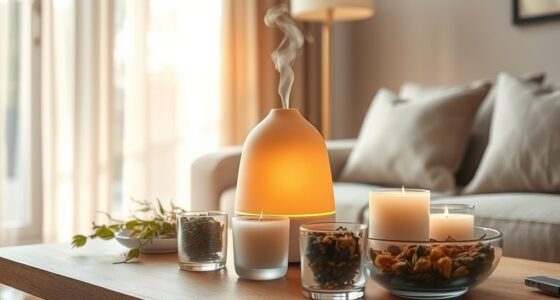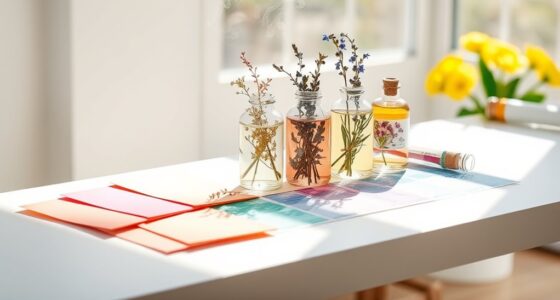Clutter can substantially impact your mental clarity, making you feel overwhelmed and anxious. Scientific studies show that visual chaos triggers stress responses and hampers concentration, while minimalist spaces promote calm and focus. If you’re open to simplifying your environment, you can reduce anxiety and improve your overall well-being. Discover how embracing a minimalist lifestyle can create more peaceful, supportive surroundings—and learn more about the connection between clutter and anxiety.
Key Takeaways
- Cluttered spaces can increase stress and anxiety by overwhelming the brain’s ability to process information efficiently.
- Minimalist environments promote mental clarity, reduce visual distractions, and support emotional well-being.
- Scientific studies link clutter with higher anxiety levels and decreased focus.
- Personal preferences influence whether clutter causes anxiety; not all clutter impacts mental health equally.
- Organized, minimalist spaces foster calmness, better focus, and overall mental health benefits.
Understanding Clutter and Its Effects on the Mind
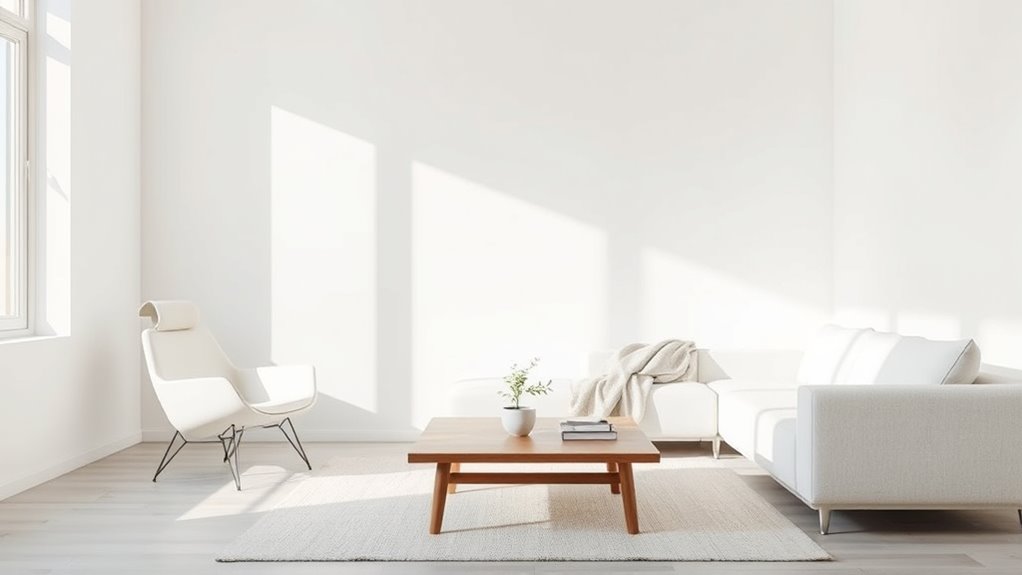
Have you ever noticed how a cluttered space can make your mind feel overwhelmed or distracted? That’s because decor organization directly impacts your mental clarity. Clutter psychology explains how physical disorder can lead to stress, anxiety, and difficulty concentrating. When your environment is chaotic, your brain struggles to process information efficiently, making it harder to focus on tasks. By understanding the effects of clutter, you realize that a tidy, organized space promotes calmness and enhances productivity. Simplifying your surroundings isn’t just about aesthetics; it’s about supporting your mental well-being. When you reduce clutter, you create a peaceful environment that helps you feel more in control and less overwhelmed. Recognizing this connection is key to embracing the minimalist home trend and improving your overall mental health. Additionally, clutter-free spaces have been shown to boost mood and reduce cortisol levels, further benefiting mental health.
The Psychology Behind Visual Chaos and Stress
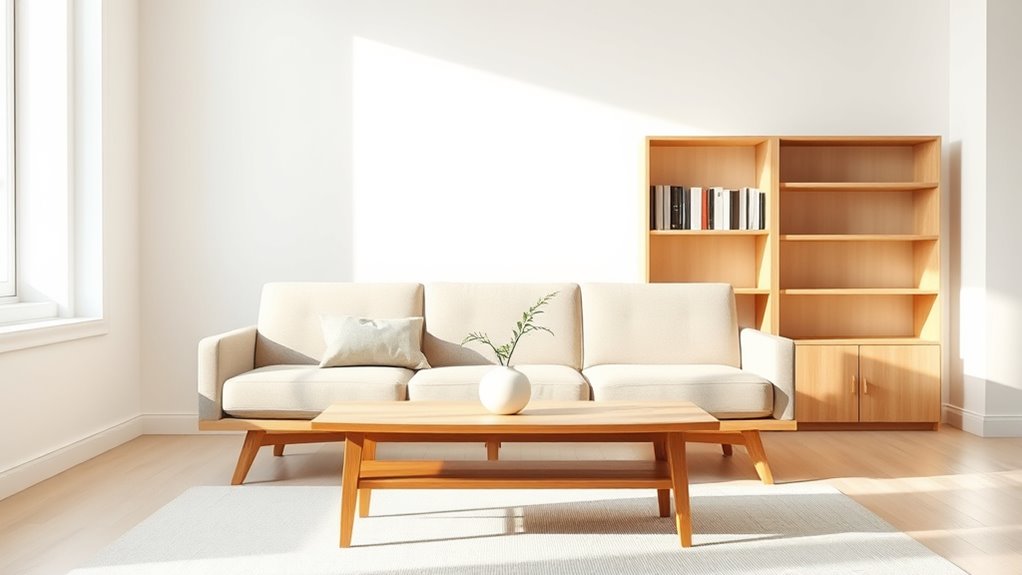
When your space is filled with visual chaos—messy surfaces, excessive decor, or conflicting colors—it triggers a stress response in your brain. This overload is fueled by color psychology; bright, clashing hues can increase anxiety, while chaotic patterns overwhelm your senses. Your brain struggles to process the clutter, leading to sensory overload, where you feel overwhelmed and unable to focus. Visual chaos diverts your attention from calming stimuli, heightening feelings of tension and frustration. The constant bombardment of conflicting visuals makes it harder to relax, as your mind perceives the clutter as a threat. Additionally, contrast ratio plays a significant role in how images are perceived, with higher contrast providing clearer and more comfortable viewing experiences that can reduce visual strain. Simplifying your environment reduces this chaos, helping you regain mental clarity and emotional stability. A clutter-free space promotes calmness by minimizing sensory overload and soothing your psychological state.
Scientific Studies Linking Clutter to Anxiety Levels
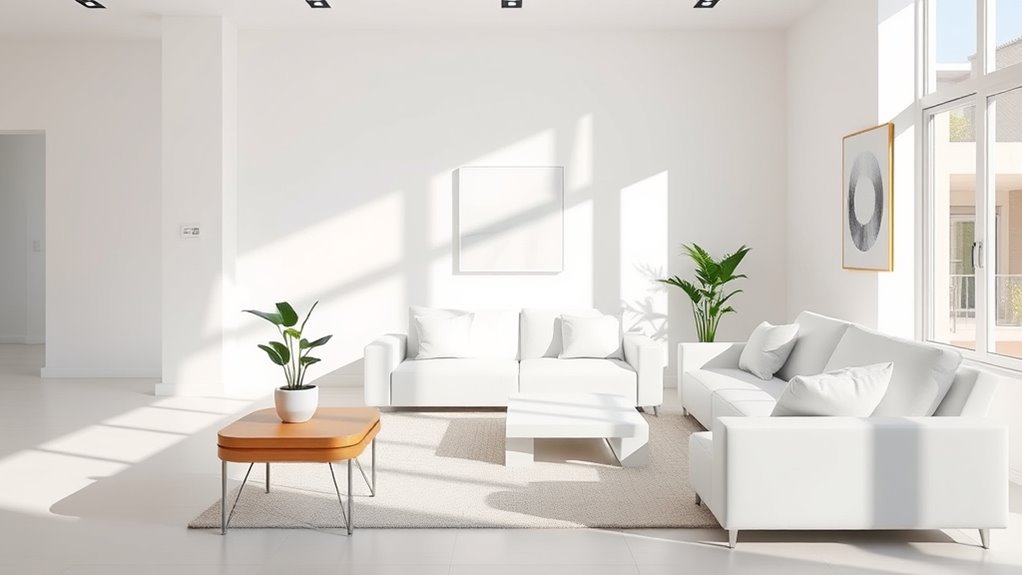
Numerous scientific studies have established a clear link between clutter and increased anxiety levels. When your environment is cluttered, it often heightens decor anxiety, making you feel overwhelmed or stressed. Research shows that clutter perception can amplify feelings of chaos, reducing your ability to focus and increasing mental fatigue. One study found that participants in cluttered spaces reported higher stress levels compared to those in tidy environments. This suggests that clutter not only impacts how you view your surroundings but also directly influences your emotional state. The more clutter you perceive around you, the more likely you are to experience heightened anxiety. These findings emphasize the importance of organized spaces in promoting mental calmness and reducing overall decor anxiety. Additionally, understanding the connection between cybersecurity vulnerabilities and digital clutter underscores the necessity of maintaining secure and streamlined digital environments to support mental well-being.
How Minimalism Can Influence Mental Well-Being
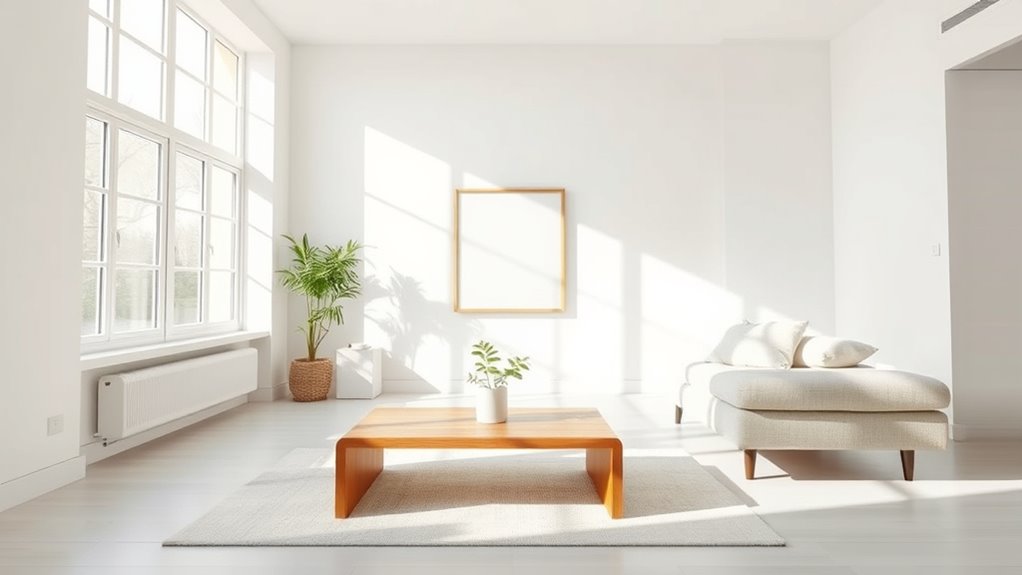
When you simplify your space, you notice fewer visual distractions, which helps clear your mind. This creates a more peaceful environment that can reduce stress and increase focus. As a result, minimalism can markedly boost your overall sense of calm and well-being. Incorporating comfort solutions like cozy furniture and supportive accessories can further enhance this tranquil atmosphere.
Reduced Visual Distractions
Minimalist home designs reduce visual clutter, making it easier for your mind to focus and relax. When your space is streamlined, your eyes aren’t constantly darting around, which decreases mental fatigue. Color psychology plays a role here—soothing hues like soft neutrals promote calm, while bold accents are used sparingly to avoid overstimulation. Decorative accessories are kept to a minimum, serving purpose rather than filling space, so your environment feels organized and intentional. This intentional approach limits distractions, helping you stay present and centered. With fewer visual stimuli, your brain can process information more efficiently, reducing stress and enhancing overall mental clarity. Additionally, cookie categories such as Necessary and Functional cookies help maintain a seamless browsing experience while supporting your privacy preferences. Ultimately, a minimalist space supports your well-being by fostering a peaceful environment free of unnecessary visual noise.
Enhanced Sense of Calm
A clutter-free environment naturally fosters a sense of calm and mental clarity. When your space is simplified, you reduce sensory overload, making it easier to focus and relax. Minimalist homes create an atmosphere conducive to art therapy, allowing you to express emotions without distraction. Clutter can overwhelm your senses, heightening anxiety and stress. By decluttering, you give yourself room to breathe and think clearly. This intentional simplicity promotes mindfulness and emotional well-being. As your space becomes more serene, you’ll find yourself feeling more centered and in control. The calming effect of minimalism isn’t just visual—it influences your mental state, helping you manage daily stress better. Ultimately, a minimalist home supports a peaceful mind, making it easier to enjoy moments of calm amid life’s chaos. Incorporating clutter reduction into your lifestyle is an effective way to enhance mental health and overall well-being.
Practical Benefits of a Decluttered Home Environment
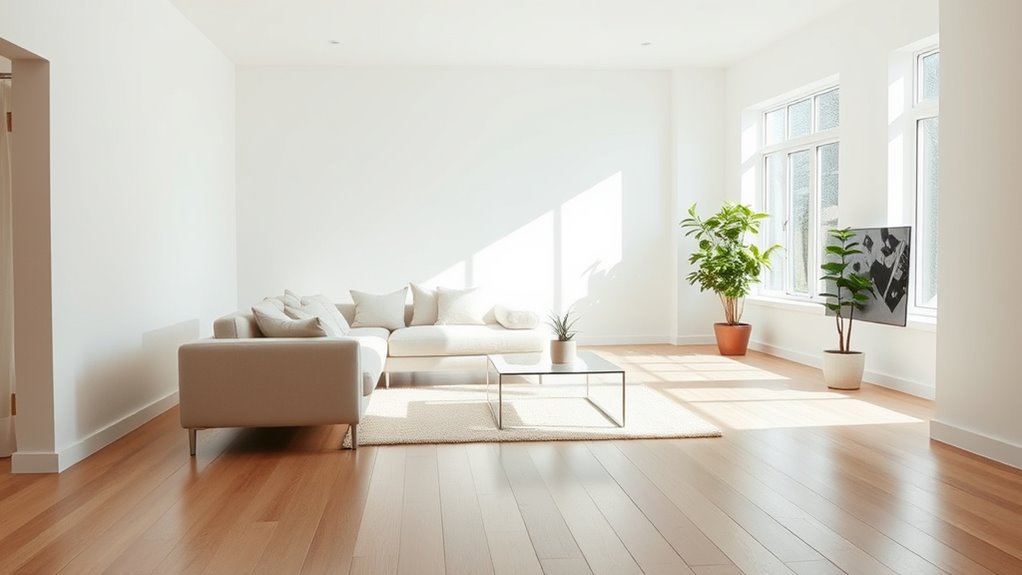
When your home is decluttered, you’ll notice greater mental clarity and a more open living space. This simplicity can make daily routines smoother and more manageable. Plus, reducing clutter often leads to lower stress levels, helping you feel calmer and more in control. Additionally, a clear space can promote better mental well-being by reducing visual distractions and creating a more peaceful environment.
Increased Mental Clarity
Decluttering your home can considerably boost mental clarity by reducing visual chaos and minimizing distractions. When your space is free of clutter, you’re less likely to feel overwhelmed by visual clutter that competes for your attention. This simplification helps you focus more easily on tasks and decisions, clearing mental space for creativity and problem-solving. Less clutter also reduces emotional overload, allowing you to feel calmer and more centered. As your environment becomes more organized, your mind naturally follows suit, leading to improved concentration and a sense of control. Creating a clean, orderly space can also foster mindful decluttering habits that promote ongoing mental well-being, making everyday life more manageable and enjoyable.
Enhanced Living Space
Reducing clutter transforms your living space into a more functional and inviting environment. An organized home enhances your daily routines, making tasks quicker and easier. Here’s how:
- Streamlined Organizing Routines: With fewer items, you spend less time searching for essentials.
- Visual Clarity: Clear surfaces and open spaces promote calmness and focus.
- Improved Use of Color Psychology: Decluttering allows you to choose colors that boost mood and productivity.
- Enhanced Room Functionality: Less clutter creates versatile spaces for work, relaxation, or socializing.
- Better Sound Environment: A decluttered space can reduce noise distractions, creating a more peaceful atmosphere sound design.
Reduced Stress Levels
A cluttered home can easily lead to feelings of overwhelm and anxiety, but maintaining a tidy space helps keep stress at bay. When your environment is organized, you can focus better and feel calmer. Minimalist decorating styles and smart storage solutions eliminate visual noise, reducing mental clutter. This simplicity fosters a peaceful atmosphere where you’re less likely to feel overwhelmed. Clear surfaces and well-chosen storage options make it easier to find what you need, saving time and frustration. The benefits extend beyond aesthetics, creating a sense of control and relaxation. Here’s a quick look at how decluttering impacts stress:
| Idea | Effect |
|---|---|
| Simplified decorating | Less visual distraction |
| Organized storage | Easier access to essentials |
| Less cluttered surfaces | Promotes calm and focus |
| Consistent decluttering | Maintains mental clarity |
| Minimalist style | Encourages peaceful, stress-free living |
Additionally, reducing clutter can improve skincare routines by making it easier to access and organize skincare products, ultimately contributing to a calmer, more orderly environment.
Common Misconceptions About Clutter and Stress
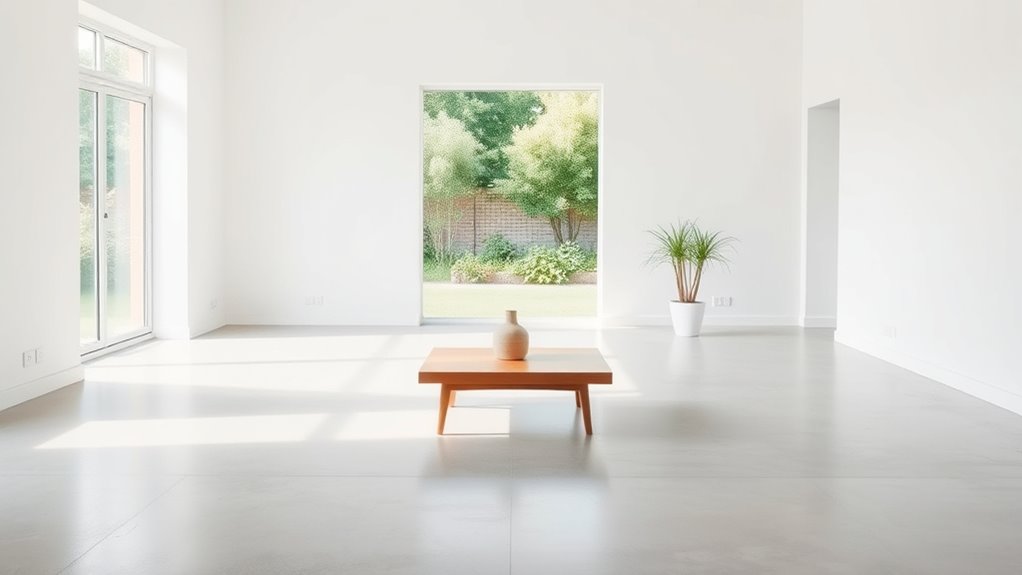
Many people believe that clutter directly causes stress, but the relationship isn’t always so straightforward. Not all clutter impacts you equally. For example:
- Decorative clutter, like ornaments or art, can enhance your space and mood.
- Sentimental possessions often hold emotional value, providing comfort rather than chaos.
- The way clutter is organized matters—messy piles can be stressful, while tidy displays aren’t.
- Personal preferences vary; some thrive in minimalism, others find comfort in a lived-in look.
Understanding this helps you see that not all clutter is harmful. It’s about the meaning behind what you keep and how it’s arranged. Clutter isn’t inherently stressful; it’s how you interpret and manage it that counts.
Tips for Transitioning to a Minimalist Living Space
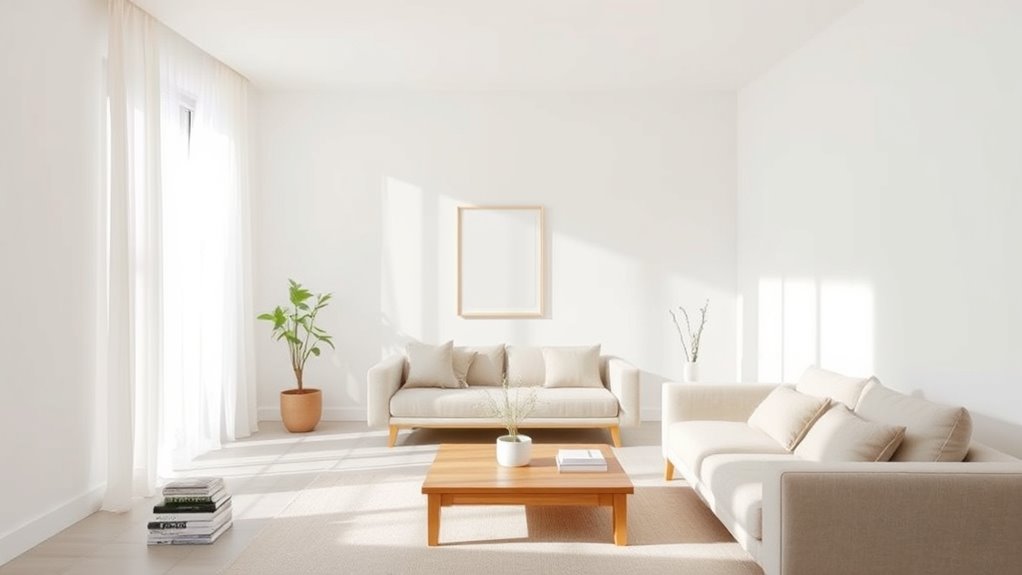
Switching to a minimalist living space can feel overwhelming at first, but breaking the process into manageable steps makes it easier. Start with decluttering techniques like sorting items into keep, donate, or discard piles. Focus on one area at a time, such as your closet or coffee table, to avoid feeling overwhelmed. Once you’ve decluttered, invest in decor organization solutions like storage bins, shelves, or baskets to keep essentials tidy. Keep only what adds value or joy, and remove anything unnecessary. Regularly reassess your space to maintain simplicity. Remember, minimalism isn’t about perfection but creating a calming environment. Taking small, intentional steps will gradually transform your home into a clutter-free space that promotes relaxation and clarity.
Personal Stories: Living Clutter-Free and Feeling Better
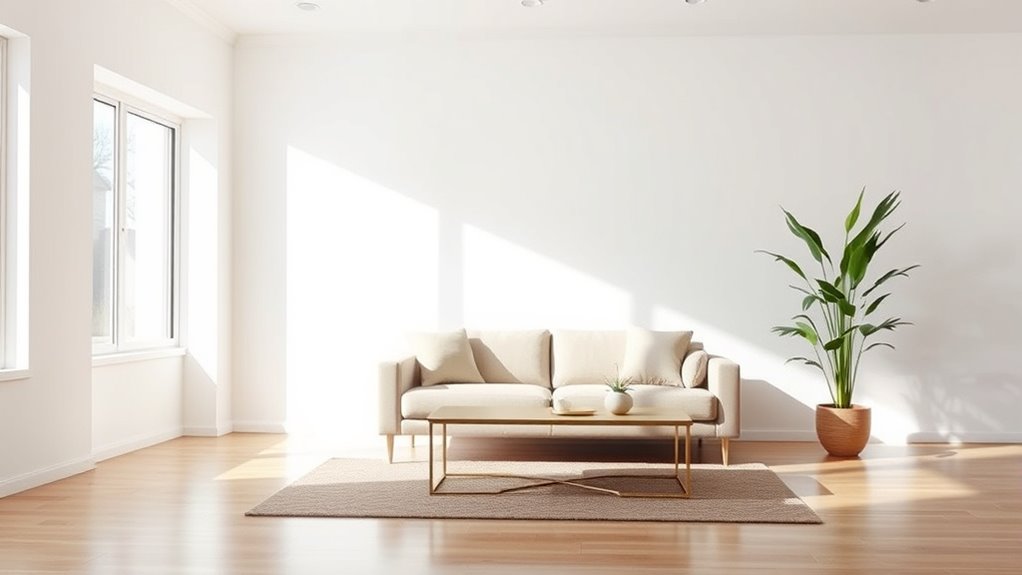
Have you ever noticed how a cluttered space can weigh on your mind and mood? Personal stories show that living clutter-free can remarkably boost your well-being. Here’s how:
- You discover better storage solutions that keep essentials organized
- Your space embraces aesthetic minimalism, creating a calming atmosphere
- You spend less time searching for things, reducing daily stress
- You enjoy more mental clarity and focus throughout your day
Many find that simplifying their environment leads to a sense of control and peace. By decluttering and choosing functional storage solutions, you create a space that feels open and inviting. This personal transformation not only improves your home’s look but also enhances your mental health, proving that less truly can be more.
The Future of Minimalism: Trends and Mental Health Insights
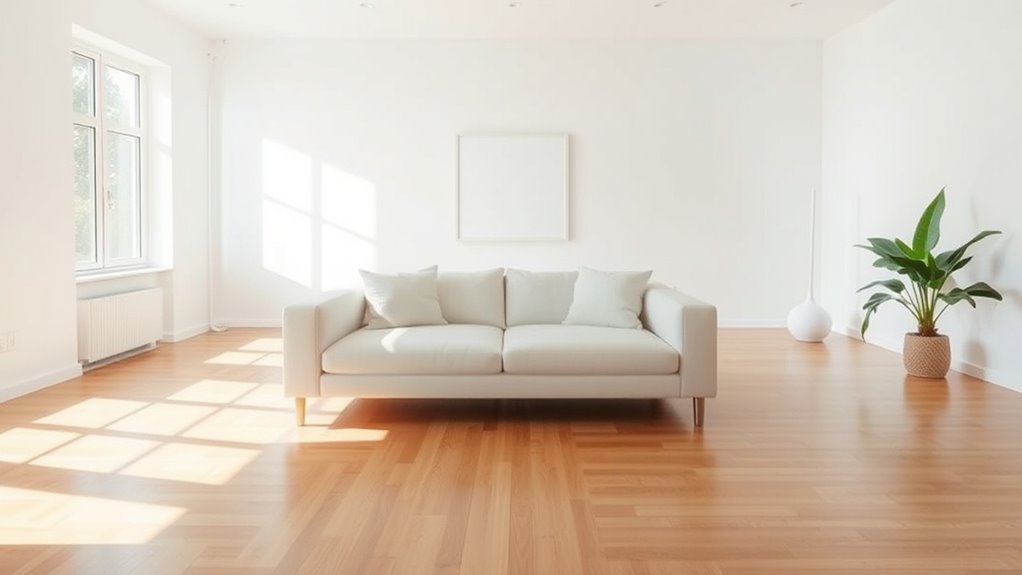
As minimalist living continues to gain popularity, emerging trends are shaping how you approach decluttering and mental health. Neuroscience research reveals that simple, organized spaces reduce stress and improve focus, encouraging interior design to prioritize calm, functional environments. Future trends will likely emphasize the integration of natural materials and biophilic design elements, fostering a sense of well-being. Expect more homes to incorporate smart storage solutions that keep clutter out of sight, supporting mental clarity. As awareness grows around mental health, minimalist principles will evolve to include mindful consumption and intentional living. This shift aims to create spaces that not only look clean but also promote emotional balance, making your home a sanctuary for mental wellness.
Frequently Asked Questions
Can Minimalism Improve Mental Health Even if I’M Not Naturally Organized?
If you’re not naturally organized, minimalism can still boost your mental health by reducing emotional clutter and encouraging better organizational habits. Simplifying your space helps clear your mind and lowers stress, even if organizing isn’t your strength. You don’t need perfection—small steps toward decluttering can make a big difference. Over time, this approach helps you feel calmer, more focused, and in control, improving your overall well-being.
Does Decluttering Have Long-Term Effects on Anxiety or Stress Levels?
Decluttering can have long-term effects on your anxiety and stress levels by improving space optimization and reducing sensory overload. When you clear unnecessary items, your environment feels calmer and more organized, making it easier to relax and focus. Over time, this habit helps you maintain a clutter-free space that minimizes distractions and triggers, leading to sustained mental health benefits and a more peaceful, manageable living environment.
Are There Specific Types of Clutter More Harmful to Mental Health?
While some clutter feels manageable, storage solutions can’t hide visual chaos that overwhelms your mind. You might not notice it immediately, but clutter with personal attachments or excess items often triggers stress more than simple disorganization. The key is recognizing that clutter which blocks pathways or accumulates in visible areas impacts mental health more deeply, making it essential to tackle specific types of clutter for a calmer, clearer space.
How Do Cultural Differences Influence Perceptions of Clutter and Minimalism?
Cultural perceptions greatly influence how you view clutter and minimalism. In some cultures, aesthetic differences celebrate abundant decor and personal expression, making clutter less stressful. Others prioritize simplicity and organization, viewing clutter as chaotic. Your cultural background shapes your comfort level with clutter, affecting your mental well-being. Embracing these differences helps you understand your own preferences and creates a living space that aligns with your values and reduces anxiety.
What Role Does Emotional Attachment Play in Maintaining Clutter?
You might think letting go of sentimental clutter is easy, but emotional attachment keeps it stubbornly in place. It’s ironic—you’re haunted by memories, yet holding onto things only fuels attachment loss. Your possessions become symbols of past moments, making it harder to declutter. Emotional ties create a barrier, turning simple storage into a fortress of sentimentality, preventing you from embracing minimalism and freeing yourself from the weight of attachment.
Conclusion
By embracing minimalism, you can clear the chaos and lighten your mental load. It’s not just about having a tidy space but creating an environment that nurtures your well-being. Don’t wait until clutter becomes a storm you can’t weather—take small steps now. Remember, a cluttered home often leads to a cluttered mind, and you don’t want to be caught between a rock and a hard place. Start today and feel the difference!
